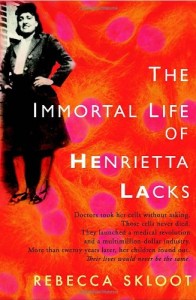Today I met Rebecca Skloot, the author of The Immortal Life of Henrietta Lacks, mentioned in my previous blog post. Skloot’s book is the UW Madison Go Big Read program’s selection for this year, so she gave a public lecture last night, and visited the journalism school this morning to take questions.
As far as author presentations go, I loved this one, because Skloot pretty much just plopped down in a chair and said what do you want to know? It was a small group (25-30 people) but the discussion kept up for over an hour just based on audience questions. My question for her was whether she was prepared for the Lacks family’s lack of science education and how she viewed her role as a journalist but also as their teacher. Her response was that the two roles were essentially one because her reporting style is based around an informal conversation, but that she wasn’t really prepared for how confused they were about what HeLa is.
 Other questions that were asked ran the gamut from the business of publishing a book, to how Skloot handled Deborah’s death and incorporated it into the book, how she decided on the structure of the book, and how she handled (and organized) 10 years worth of notes. She was an engaging speaker, and was even willing to talk about some of the criticisms of her that have come up since the book came out.
Other questions that were asked ran the gamut from the business of publishing a book, to how Skloot handled Deborah’s death and incorporated it into the book, how she decided on the structure of the book, and how she handled (and organized) 10 years worth of notes. She was an engaging speaker, and was even willing to talk about some of the criticisms of her that have come up since the book came out.
The biggest criticism of Skloot out there is that she isn’t doing enough to help the Lacks family. But, she has set up a foundation for them — and I think its important to remember that for 10 years Skloot was accumulating debt chasing down this story, if the book hadn’t been a success she’d definitely be in the hole so I agree with her unapologetic attitude toward the money she’s made from the book’s success.
She also mentioned that she sometimes gets push back from people who don’t agree with the fact that she kept all of the interviews in their original dialect (people saying it puts down the lesser educated black people who don’t speak with proper grammar) but Skloot points out that she kept the dialect and “broken” English of European and Asian researchers as well as the Lacks family.
According to Skloot the biggest problem she’s encountered so far has been from the white members of the Lacks family. In the whole two pages that the white Lackses are discussed, they definitely appear as racists. But, it is Skloot’s word against the word of the children of her sources (her sources are now dead) who have argued that Skloot couldn’t possibly have done the interviews because their parents wouldn’t have said the things Skloot says they did.
Considering how utterly unimportant the white Lacks family is to the story, it’s sort of absurd to think that Skloot didn’t really do the reporting. It would be such a dumb part of the story to make up, so I’m inclined to believe that the interviews are true.
This book is undoubtedly going to be Skloot’s literary legacy, so overall it was fun to get another first hand perspective on what it takes to research, write, and market a successful science book.